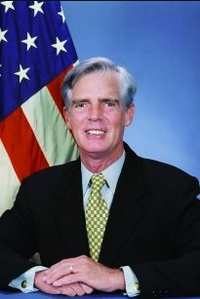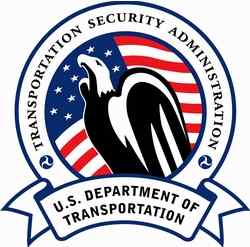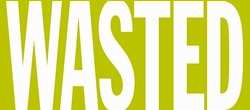 The DoT's Inspector General, Kenneth Mead (right),
addressed the Senate's Subcommittee on Aviation, Committee on
Commerce, Science and Transportation on Wednesday, with his
assessment of the TSA's management and responsibility to the
taxpayers, and his assessment wasn't complimentary. The
TSA, he found, is a spending machine, with few effective controls
on the money spigot.
The DoT's Inspector General, Kenneth Mead (right),
addressed the Senate's Subcommittee on Aviation, Committee on
Commerce, Science and Transportation on Wednesday, with his
assessment of the TSA's management and responsibility to the
taxpayers, and his assessment wasn't complimentary. The
TSA, he found, is a spending machine, with few effective controls
on the money spigot.
For instance, he noted, "...one contract with initial cost
estimates of $104 million grew to an estimated $700 million.
TSA must have the infrastructure to monitor and control its
operating costs, especially given the large number and dollar
volume of contracts it is managing, about $8.5 billion at the end
of calendar year 2002 and continuing to grow."
Nobody cared how much it would cost.
Mead continued, "As we tracked TSA's progress in meeting the
deadlines for the deployment of screeners and explosives detection
equipment, we identified weaknesses in the controls over the
interim contracts with screener companies, the contract for hiring
the screener workforce, and the contract for deployment of
explosives detection equipment."
A quick audit showed 1/5 of the money used in a questionable
manner...
"The DCAA [Defense Contract Audit Agency] audited costs on the
screener contracts and questioned over $124 million of almost $620
million audited.
...or maybe it was half...
"A TSA review of an NCS Pearson subcontractor with $18 million
in expenses, determined that between $6 million and $9 million of
these expenses appear to be attributed to wasteful and abusive
spending practices."
The Inspector General also warned of TSA's insatiable lust for
power and control:
 He wrote, "...it is important that the agency
avoid extending itself beyond the basic tenets of the Act.s
requirements. For example, we previously testified that TSA
needed to avoid mission creep. While the law is only explicit about
a Federal law enforcement presence at checkpoints, TSA was
considering expanding its law enforcement presence at the airports.
TSA later abandoned these plans. However, TSA is now considering
extending Federal Air Marshals. duties to conducting surveillance
and patrolling at airports. The Federal Air Marshals were set up to
guard flights. Before extending their mission, we hope TSA
carefully considers the budgetary and staffing implications, and
thoroughly vets this issue with airport authorities and Federal and
local law enforcement agencies."
He wrote, "...it is important that the agency
avoid extending itself beyond the basic tenets of the Act.s
requirements. For example, we previously testified that TSA
needed to avoid mission creep. While the law is only explicit about
a Federal law enforcement presence at checkpoints, TSA was
considering expanding its law enforcement presence at the airports.
TSA later abandoned these plans. However, TSA is now considering
extending Federal Air Marshals. duties to conducting surveillance
and patrolling at airports. The Federal Air Marshals were set up to
guard flights. Before extending their mission, we hope TSA
carefully considers the budgetary and staffing implications, and
thoroughly vets this issue with airport authorities and Federal and
local law enforcement agencies."
Suggestion: consider who's going to pay, and how much
With the industry already suffering huge losses, and with
customers' staying away, the last thing that's needed for airlines,
is a mandate from the TSA to charge even more. While
"airlines" and "airports" are said to pay for so much of the TSA's
heavy-handedness, the fact remains that "airlines" and "airports"
are just different names for "the traveleing public." When "general
funds" are mentioned, that's the traveling public, plus
everybody who doesn't fly -- in other words, public subsidy of
business fliers and vacationers.
Big dollars soon to be spent, to cover slapdash original
implementation
"A major issue on the horizon is funding the next phase of EDS
integration," he said. "Thus far, nearly all EDS equipment has
been lobby-installed. TSA's planned next step (integrating the
EDS equipment into airport baggage systems) is by far the most
costly aspect of full implementation. The task will not be to
simply move the machines from lobbies to baggage handling
facilities but will require major facility modifications."
Mead urged, "A key question is who will pay for those costs and
how. The difference between TSA expenses and current aviation
security revenues from taxes and airline fees cannot be covered by
cost savings alone. The means for bridging this gap needs to be
decided. To what extent it will be accomplished through the General
Fund of the Treasury or aviation system users, which ultimately
means passengers, airlines, and airports."
Crushing taxes already hurt, plenty.
 Mead
didn't think another TSA cost pass-through was the answer. He
noted, "We urge great caution before adding additional fees or
taxes for air travel. Consumers already pay a significant amount in
aviation taxes and fees. For example, a $100 non-stop round trip
ticket includes approximately $26 (26 percent) in taxes and fees.
Put differently, the airlines receive approximately $74 and the
government gets $26. A $200 single-connection round trip ticket
includes approximately $51 (26 percent) in taxes and fees. Here the
airline gets approximately $149 and the government gets $51. The
current financial state of the airline industry will make it
difficult for air carriers or their passengers to pay the billions
of dollars required each year to cover TSA's expenses."
Mead
didn't think another TSA cost pass-through was the answer. He
noted, "We urge great caution before adding additional fees or
taxes for air travel. Consumers already pay a significant amount in
aviation taxes and fees. For example, a $100 non-stop round trip
ticket includes approximately $26 (26 percent) in taxes and fees.
Put differently, the airlines receive approximately $74 and the
government gets $26. A $200 single-connection round trip ticket
includes approximately $51 (26 percent) in taxes and fees. Here the
airline gets approximately $149 and the government gets $51. The
current financial state of the airline industry will make it
difficult for air carriers or their passengers to pay the billions
of dollars required each year to cover TSA's expenses."
[Note that Mead is talking only about the taxes on the tickets
themselves, and not the airlines' and airports' other taxes: Social
Security, fuel, payroll, workman's comp, corporate income taxes,
operating licenses, government-mandated insurance, insurance
mandated by threat of government bureaucratic
action (e.g., EPA, OSHA), and so on. In other words, Mead
doesn't begin to touch the real cost of government; even so, his
numbers are frightening --ed.]
Distribution of costs of the TSA's 'security' efforts is a
matter for Congress; but Mead offered too many choices for funding:
"...Congress will ultimately have to make a decision about how
these costs will be paid for and the proper mix between airlines,
airports, passengers, and the General Fund." In other words, will
travelers pay, or will the taxpayers in general, be held up for the
costs? [Much as ANN is predisposed toward making the burden on
fliers as light as practical, is it fair to have the non-flying
public pay for the costs of the flying public? --ed.]
...but TSA said it MET the deadline
Mead noted, the TSA's press releases notwithstanding, "Although
TSA made every effort to meet the December 31st deadline to screen
all checked baggage using explosives detection equipment,
deployment of the equipment was not completed at all the Nation's
commercial airports." Nobody thought it was possible; and only the
TSA said it was done. That misleading claim, though, was good
enough to keep federal prosecutors from throwing the book at
negligent TSA officials.
Possible TSA fraud uncovered:
 Mead
made almost a footnote of some possibly criminal activity, when he
said, "...Congress, in TSA's FY 2002 supplemental appropriation,
provided a $738 million set-aside for 'physical modification of
commercial service airports for the purpose of installing EDS and
trace machines.' There now appears to be some question as to
whether the set-aside was spent for its intended purpose."
Mead
made almost a footnote of some possibly criminal activity, when he
said, "...Congress, in TSA's FY 2002 supplemental appropriation,
provided a $738 million set-aside for 'physical modification of
commercial service airports for the purpose of installing EDS and
trace machines.' There now appears to be some question as to
whether the set-aside was spent for its intended purpose."
He gave the official explanation: "...the Airports Council
International reported they had learned that $500 million of the
$738 million was shifted to fund the Boeing contract." However,
Mead made it clear that, "Boeing's contract does not include the
purchase of explosives detection equipment, which will be funded
separately by TSA." Nevertheless, he writes, "TSA agrees that $500
million of the $738 million was used to fund the Boeing contract
and views using the $500 million toward Boeing's efforts as
appropriate." Misappropriation, thus, is "appropriate" in the TSA
world.
Plenty more areas for money to not be squandered:
Mead noted that most of the "heavy lifting" has yet to happen,
and cited such diverse areas as finishing the EDS screening of
baggage; cargo screening; airport infrastructure changes;
curtailing TSA's extravagant recruiting costs, and many other
areas. Overall, Congress got an earful, even though Mead, like all
good politicians, cloaked the flagrant mismanagement, untrue
statements, and possible fraudulent use of funds in silky rhetoric.
Read the report yourself, at the link below.
 NTSB Prelim: Sikorsky UH60 Sikorsky UH-60
NTSB Prelim: Sikorsky UH60 Sikorsky UH-60 Aero-News: Quote of the Day (11.13.25)
Aero-News: Quote of the Day (11.13.25) ANN's Daily Aero-Term (11.13.25): Ground Clutter
ANN's Daily Aero-Term (11.13.25): Ground Clutter ANN's Daily Aero-Linx (11.13.25)
ANN's Daily Aero-Linx (11.13.25) Airborne 11.07.25: Affordable Expo Starts!, Duffy Worries, Isaacman!
Airborne 11.07.25: Affordable Expo Starts!, Duffy Worries, Isaacman!






